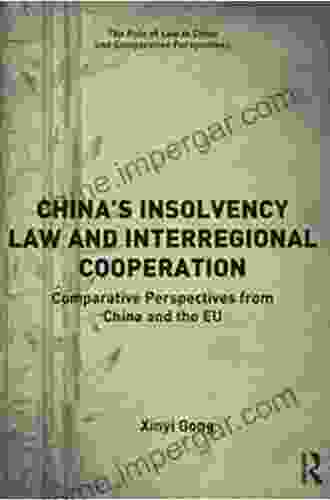Comparative Perspectives From China And The Eu The Rule Of Law In China And

The rule of law is a fundamental principle of both China and the European Union (EU). It is the idea that all people, including those in power, are subject to the law and that no one is above the law. The rule of law is essential for protecting human rights, ensuring fair trials, and promoting economic growth.
4.4 out of 5
| Language | : | English |
| File size | : | 2611 KB |
| Text-to-Speech | : | Enabled |
| Screen Reader | : | Supported |
| Enhanced typesetting | : | Enabled |
| Word Wise | : | Enabled |
| Print length | : | 255 pages |
However, the rule of law is implemented differently in China and the EU. In China, the Communist Party of China (CPC) has a strong influence over the legal system. The CPC can interpret the law as it sees fit, and it can also use the law to suppress dissent. In the EU, on the other hand, the rule of law is more independent of political power. The courts are independent of the government, and they are responsible for interpreting the law. This makes it more difficult for the government to use the law to suppress dissent.
There are a number of similarities between the rule of law in China and the EU. Both systems recognize the importance of the rule of law, and both systems have laws to protect human rights and ensure fair trials. However, there are also a number of differences between the two systems. The most significant difference is the role of the Communist Party of China in the Chinese legal system.
The CPC's influence over the legal system in China has a number of implications. First, it means that the law is not always applied equally. The CPC can use the law to target its political opponents, and it can also use the law to protect its own interests. Second, it means that the courts are not always independent of the government. The CPC can influence the decisions of the courts, and it can also use the courts to suppress dissent.
The rule of law is a complex issue, and there is no easy way to compare the rule of law in China and the EU. However, by understanding the similarities and differences between the two systems, we can better understand the challenges that each system faces.
The Rule of Law in China
The rule of law is a relatively new concept in China. The traditional Chinese legal system was based on Confucian principles, which emphasized social harmony and respect for authority. The rule of law was not seen as a way to protect individual rights, but rather as a way to maintain social Free Download.
The concept of the rule of law was introduced to China in the late 19th century by Western missionaries and diplomats. It was gradually adopted by the Chinese government, and it was incorporated into the Chinese constitution in 1982. However, the rule of law has not always been fully implemented in China. The CPC has a strong influence over the legal system, and it can use the law to suppress dissent.
In recent years, there has been a growing movement in China to promote the rule of law. This movement is led by lawyers, judges, and academics who believe that the rule of law is essential for protecting human rights and ensuring fair trials. The movement has made some progress, but it faces a number of challenges. The CPC remains resistant to the idea of an independent judiciary, and it continues to use the law to suppress dissent.
The Rule of Law in the EU
The rule of law is a fundamental principle of the EU. It is enshrined in the EU treaties, and it is interpreted by the European Court of Justice (ECJ). The ECJ has ruled that the rule of law requires that all EU member states have an independent judiciary, that the law is applied equally to all citizens, and that human rights are protected.
The rule of law is relatively well-established in the EU. The courts are independent of the government, and they are responsible for interpreting the law. The law is applied equally to all citizens, and human rights are protected. However, there are still some challenges to the rule of law in the EU. For example, some member states have been accused of using the law to suppress dissent.
Comparative Perspectives
There are a number of similarities between the rule of law in China and the EU. Both systems recognize the importance of the rule of law, and both systems have laws to protect human rights and ensure fair trials. However, there are also a number of differences between the two systems. The most significant difference is the role of the Communist Party of China in the Chinese legal system.
The CPC's influence over the legal system in China has a number of implications. First, it means that the law is not always applied equally. The CPC can use the law to target its political opponents, and it can also use the law to protect its own interests. Second, it means that the courts are not always independent of the government. The CPC can influence the decisions of the courts, and it can also use the courts to suppress dissent.
In the EU, on the other hand, the rule of law is more independent of political power. The courts are independent of the government, and they are responsible for interpreting the law. This makes it more difficult for the government to use the law to suppress dissent.
The different approaches to the rule of law in China and the EU have a number of implications. In China, the rule of law is used to maintain social Free Download and to protect the interests of the CPC. In the EU, on the other hand, the rule of law is used to protect individual rights and to ensure fair trials. This difference in approach has a significant impact on the way that the two systems operate.
The rule of law is a complex issue, and there is no easy way to compare the rule of law in China and the EU. However, by understanding the similarities and differences between the two systems, we can better understand the challenges that each system faces.
The rule of law is essential for protecting human rights, ensuring fair trials, and promoting economic growth. It is a fundamental principle of both China and the EU, but it is implemented differently in each system. By understanding the different approaches to the rule of law in China and the EU, we can better understand the challenges that each system faces.
4.4 out of 5
| Language | : | English |
| File size | : | 2611 KB |
| Text-to-Speech | : | Enabled |
| Screen Reader | : | Supported |
| Enhanced typesetting | : | Enabled |
| Word Wise | : | Enabled |
| Print length | : | 255 pages |
Do you want to contribute by writing guest posts on this blog?
Please contact us and send us a resume of previous articles that you have written.
 Book
Book Novel
Novel Page
Page Chapter
Chapter Text
Text Story
Story Genre
Genre Reader
Reader Library
Library Paperback
Paperback E-book
E-book Magazine
Magazine Newspaper
Newspaper Paragraph
Paragraph Sentence
Sentence Bookmark
Bookmark Shelf
Shelf Glossary
Glossary Bibliography
Bibliography Foreword
Foreword Preface
Preface Synopsis
Synopsis Annotation
Annotation Footnote
Footnote Manuscript
Manuscript Scroll
Scroll Codex
Codex Tome
Tome Bestseller
Bestseller Classics
Classics Library card
Library card Narrative
Narrative Biography
Biography Autobiography
Autobiography Memoir
Memoir Reference
Reference Encyclopedia
Encyclopedia Susan Pease Gadoua
Susan Pease Gadoua Rebecca Frankel
Rebecca Frankel Ms Salad
Ms Salad Jennifer Goett
Jennifer Goett Noel Dejesus
Noel Dejesus Vincent F Hendricks
Vincent F Hendricks Bertice Berry
Bertice Berry Michael Eigen
Michael Eigen Benjamin Dangl
Benjamin Dangl Janet Jackson
Janet Jackson Bobby Azarian
Bobby Azarian Jun Ohta
Jun Ohta Barbie Ladeveze
Barbie Ladeveze Bill Mills
Bill Mills Crystal Bowman
Crystal Bowman Ceri Roderick
Ceri Roderick Bill Owens
Bill Owens Barton Press
Barton Press Bobby Henderson
Bobby Henderson Billy Go
Billy Go
Light bulbAdvertise smarter! Our strategic ad space ensures maximum exposure. Reserve your spot today!

 Cameron ReedBasic Principles of Drug Discovery and Development: An Essential Guide for...
Cameron ReedBasic Principles of Drug Discovery and Development: An Essential Guide for... Ashton ReedFollow ·16.9k
Ashton ReedFollow ·16.9k Robin PowellFollow ·3.7k
Robin PowellFollow ·3.7k Allen GinsbergFollow ·12.7k
Allen GinsbergFollow ·12.7k W.B. YeatsFollow ·15.5k
W.B. YeatsFollow ·15.5k Jeremy CookFollow ·15.5k
Jeremy CookFollow ·15.5k Jon ReedFollow ·11.7k
Jon ReedFollow ·11.7k Walt WhitmanFollow ·15.4k
Walt WhitmanFollow ·15.4k Billy FosterFollow ·9.1k
Billy FosterFollow ·9.1k

 Edison Mitchell
Edison MitchellFrench Strategy and Operations in the Great War
An In-Depth Examination of Military Genius ...

 Harvey Hughes
Harvey HughesArts In Health: Designing And Researching Interventions
Delving into the...

 Walt Whitman
Walt WhitmanHealing and Hope for Those with Empty Arms
A Comprehensive Guide for Grieving...

 DeShawn Powell
DeShawn PowellUniversity of Maine Ice Hockey: A Legacy of Frozen Glory
Nestled in the heart of Maine, a state...

 George Hayes
George HayesControl For Aluminum Production And Other Processing...
In today's competitive manufacturing...

 Ben Hayes
Ben HayesThe Lost Obelisks Of Egypt: A Journey into the Depths of...
: The Enduring Allure of Egypt's Ancient...
4.4 out of 5
| Language | : | English |
| File size | : | 2611 KB |
| Text-to-Speech | : | Enabled |
| Screen Reader | : | Supported |
| Enhanced typesetting | : | Enabled |
| Word Wise | : | Enabled |
| Print length | : | 255 pages |










